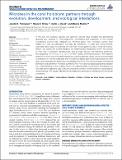| dc.contributor.author | Rivera, Hanny E. | |
| dc.contributor.author | Closek, Collin J. | |
| dc.contributor.author | Thompson, Janelle Renee | |
| dc.contributor.author | Medina, Monica | |
| dc.date.accessioned | 2015-02-11T17:23:55Z | |
| dc.date.available | 2015-02-11T17:23:55Z | |
| dc.date.issued | 2015-01 | |
| dc.date.submitted | 2014-06 | |
| dc.identifier.issn | 2235-2988 | |
| dc.identifier.uri | http://hdl.handle.net/1721.1/94330 | |
| dc.description.abstract | In the last two decades, genetic and genomic studies have revealed the astonishing diversity and ubiquity of microorganisms. Emergence and expansion of the human microbiome project has reshaped our thinking about how microbes control host health—not only as pathogens, but also as symbionts. In coral reef environments, scientists have begun to examine the role that microorganisms play in coral life history. Herein, we review the current literature on coral-microbe interactions within the context of their role in evolution, development, and ecology. We ask the following questions, first posed by McFall-Ngai et al. (2013) in their review of animal evolution, with specific attention to how coral-microbial interactions may be affected under future environmental conditions: (1) How do corals and their microbiome affect each other's genomes? (2) How does coral development depend on microbial partners? (3) How is homeostasis maintained between corals and their microbial symbionts? (4) How can ecological approaches deepen our understanding of the multiple levels of coral-microbial interactions? Elucidating the role that microorganisms play in the structure and function of the holobiont is essential for understanding how corals maintain homeostasis and acclimate to changing environmental conditions. | en_US |
| dc.description.sponsorship | Singapore-MIT Alliance for Research and Technology. Center for Environmental Sensing and Modeling | en_US |
| dc.description.sponsorship | Massachusetts Institute of Technology. Department of Civil and Environmental Engineering | en_US |
| dc.description.sponsorship | Massachusetts Institute of Technology. Presidential Fellowship | en_US |
| dc.language.iso | en_US | |
| dc.publisher | Frontiers Research Foundation | en_US |
| dc.relation.isversionof | http://dx.doi.org/10.3389/fcimb.2014.00176 | en_US |
| dc.rights | Creative Commons Attribution | en_US |
| dc.rights.uri | http://creativecommons.org/licenses/by/4.0/ | en_US |
| dc.source | Frontiers Research Foundation | en_US |
| dc.title | Microbes in the coral holobiont: partners through evolution, development, and ecological interactions | en_US |
| dc.type | Article | en_US |
| dc.identifier.citation | Thompson, Janelle R. et al. “Microbes in the Coral Holobiont: Partners through Evolution, Development, and Ecological Interactions.” Frontiers in Cellular and Infection Microbiology 4 (2015). | en_US |
| dc.contributor.department | Massachusetts Institute of Technology. Department of Civil and Environmental Engineering | en_US |
| dc.contributor.department | Woods Hole Oceanographic Institution | en_US |
| dc.contributor.mitauthor | Thompson, Janelle Renee | en_US |
| dc.contributor.mitauthor | Rivera, Hanny E. | en_US |
| dc.relation.journal | Frontiers in Cellular and Infection Microbiology | en_US |
| dc.eprint.version | Final published version | en_US |
| dc.type.uri | http://purl.org/eprint/type/JournalArticle | en_US |
| eprint.status | http://purl.org/eprint/status/PeerReviewed | en_US |
| dspace.orderedauthors | Thompson, Janelle R.; Rivera, Hanny E.; Closek, Collin J.; Medina, Monica | en_US |
| mit.license | PUBLISHER_CC | en_US |
| mit.metadata.status | Complete | |
